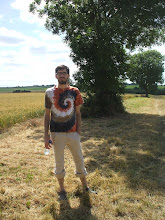[1] Another important thesis of Gubrud's post is that the Kurzweil/Moravec theory that the self is constituted by an abstract pattern that endures over time and the theory that the self is an immaterial soul are really the same theories. From the original article's comments, Gubrud writes the following:
"Philippe - Christopher Hitchens is a pissant. You write:
Holding that the self is a pattern is definitely *NOT* the same as holding that the self is a soul.
So who's "underlining" here? My entire argument is that it is the same. Where's your "critique" of that? It's the same because "pattern" is presumed to be a thing that exists apart from the substance of the body and separable from it, transferable to another body, another substance. This is essentially a mythical, magical image of soul transfer. Well, I guess I'm just "underlining" my argument again. And I guess you've proven (somehow, ad hominem I suspect) that it just isn't worth your even bothering to critique it."
[2] From the lexicon: “A pretentious attitude of scholarship; superficial knowledgeability.”
[3] Recall, for example, that John Searle maintains that computers could not possibly be conscious, and Susan Schneider holds that the sort of non-destructive uploading described in the book Mindscans would fail to transfer the self. But their reasons are quite different, and far more sophisticated, than Gubrud's.
[4] Note that the theory of evolution – of how evolutionary change actually happens – is distinct from the fact that it did occur. One could accept that evolution has occurred yet reject the Darwinian mechanism of natural selection in favor of a Lamarckian, or God-directed, one.
[5] Extrapolating from the history of science, one might even hold that most of our current theories are wrong, where “wrong” could mean either being incorrect (in which case the theory ought to be discarded) or merely being incomplete (in which case the theory need only be revised). But, of course, the possibility of a theory being wrong has no bearing on whether it is rational to accept it as true, given the evidence available at a given moment.
[6] If transhumanism is construed as below – that is, as a bipartite thesis about what will and what should be the case – then transhumanism would fail if the world turned out to be other than what it says the world is like. In other words, since ought implies can, if we can't effectively enhance the human organism, then there's no point in saying that we should.
One definition, from this paper of mine: "Transhumanism is a recent philosophical and cultural movement that has both descriptive and normative components: (1) the descriptive claim is that current and anticipated future technologies will make it possible to radically alter both our world and persons, not just by “enhancing” the capacities that we already have but also by adding entirely new capacities not previously had.1 (2) The normative claim is that we ought to do what we can to foment and accelerate the creation of such “enhancement” technologies, thereby converting the possibility of a “posthuman” future into an actuality."
[7] See my “Risk Mysterianism and Cognitive Boosters,” forthcoming in the Journal of Future Studies, for an argument to this effect.
July 17, 2010
Subscribe to:
Comments (Atom)
